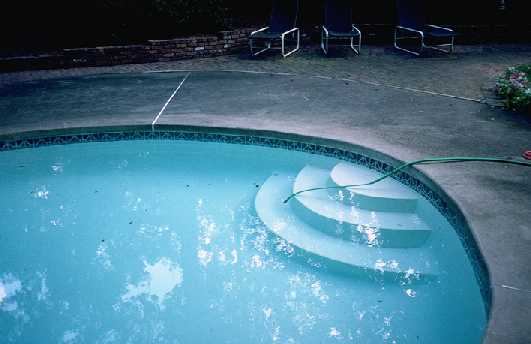It’s hard to keep water in a pool. Every swimming pool, spa, or landscape pond is probably going to leak at some point in its useful life. These pesky problems can be more than just an inconvenience. An un-repaired hole the size of a pencil tip can result in hundreds of gallons of water lost per day. In addition to the replacement cost of the water, leaks in your pool will increase chemical demands, and may lead to more serious structural and mechanical problems. Fortunately, effective leak location and leak repair solutions are available.
Pool Leak Symptoms Resulting from Water Loss

By far the most common indication of a leak is that the water level is dropping faster than what is normally attributable to evaporation or splash-out. Often leaks are big enough that excess water loss is obvious. If you wake-up to find that your pool has dropped several inches overnight you know you’ve got a problem. The bigger challenges are the smaller, yet just as serious, leaks that may develop slowly. In these cases it is important to determine what is “normal water loss” and thus avoid wasting time looking for and worrying about a leak that really isn’t there. A simple way to account for evaporation and confirm a leak is to do a Bucket Test. If you have an automatic fill device on your pool a dropping water level may not be evident; high water bills may be the first indication of a leak problem. You may also notice an increase in the chemicals required to maintain proper balance, or that there is excess algae growth because the new water that’s being put into the pool is untreated. Other pool leak symptoms may be actual evidence of the water that has escaped from your pool. Wet, mushy, or unusually “healthy” spots in the lawn may be evidence of underground plumbing leaks. Structural damage, cracks, and settling to the deck or pool may also be indications of underground leaks. If left un-repaired, these problems can quickly become more serious.
Air in the pump or blown into the pool
A pool leak in the suction side plumbing (from skimmers and main drains to equipment), may pull air into the plumbing lines that will show up in the pump or be blown back into the pool through the returns. Air leaks such as this can be just as damaging to your pool even though you may never notice symptoms of water loss. Evidence of air in the system can also be caused by a blockage or obstruction in the suction lines. Either situation will require professional attention to avoid causing mechanical damage to your pool equipment.
Finding and fixing your leak is the next step
Once you know you have a pool leak it’s time for action. The longer a leaking pipe, liner or pool shell is left un-repaired the more costly the eventual fix will be. You have options, some pool leaks can be easy to find and fix yourself. In most cases a qualified, and experienced pool leak professional using sophisticated electronic equipment will be able to provide more efficient and effective pool leak location and pool leak repair solutions that get you back into the water quickly. 
